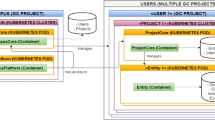Abstract
Pervasive educational games have the potential to transfer learning content to real-life experiences beyond lecture rooms, through realizing field trips in an augmented or virtual manner. This article introduces the pervasive educational game “RouteMe” that brings the rather abstract topic of routing in ad hoc networks to real-world environments. The game is designed for university-level courses and supports these courses in a motivating manner to deepen the learning experience. Students slip into the role of either routing nodes or applications with routing demands. On three consecutive levels of difficulty, they get introduced with the game concept, learn the basic routing mechanisms and become aware of the general limitations and functionality of routing nodes. This paper presents the pedagogical and technical game concept as well as findings from an evaluation in a university setting.












Similar content being viewed by others
Notes
Bachelor thesis about the evaluation method: http://apache.cs.uni-potsdam.de/de/profs/ifi/mm/studentische-arbeiten/Dehne2012.pdf.
Project thesis including the user experience tests: http://apache.cs.uni-potsdam.de/de/profs/ifi/mm/studentische-arbeiten/RouteMe_LemckeHaedge.pdf.
References
Anderson T, Shattuck J (2012) Design-based research: a decade of progress in education research? Educ Res 41(1):16–25
Backlund P, Hendrix M (2013) Educational games-are they worth the effort? A literature survey of the effectiveness of serious games. In: Proceedings of games and virtual worlds for serious applications (VS-GAMES), IEEE, pp 1–8
Ballagas R, Kuntze A, Walz SP (2008) Gaming tourism: lessons from evaluating REXplorer, a pervasive game for tourists. In: Proceedings of pervasive 2008, pp 244–261
Brown B, Reeves S, Sherwood S (2011) Into the wild: challenges and opportunities for field trial methods. In: Paper presented at the proceedings of the SIGCHI conference on human factors in computing systems
Chatzidimitris T, Gavalas D, Kasapakis V (2015) PacMap: transferring PacMan to the physical realm. arXiv:1501.02659
Chen C, Tsai Y (2009) Interactive location-based game for supporting effective English learning. In: International conference on environmental science and information application technology, pp 523–526
Chen L, Chen G, Benford S (2013) Your way your missions: a location-aware pervasive game exploiting the routes of players. Int J Hum Comput Interact 29(2):110–128
Facer K, Joiner R, Stanton D, Reid J, Hull R, Kirk D (2004) Savannah: mobile gaming and learning? J Comput Assist Learn 206:399–409
Friedrichs J (2006) Methoden empirischer Sozialforschung. VS Verlag für Sozialwissenschaften
Greanias T (2013) The alignment: ingress. Google Niantic Labs
Holzinger A (2008) Construction and evaluation of a user experience questionnaire. In: HCI and usability for education and work, pp 63–76
Johnson L, Smith R, Willis H, Levine A, Haywood K (2011) The 2011 horizon report. The New Media Consortium
Johnson L, Adams BS, Estrada V, Freeman A (2014) Horizon report: 2014 higher education edition. The New Media Consortium
Kasapakis V, Gavalas D, Bubaris N (2013) Pervasive games research: a design aspects-based state of the art report. In: Proceedings of 17th Panhellenic conference on informatics, ACM, pp 152–157
Kirman B, Linehan C, Lawson S (2012) Blowtooth: a provocative pervasive game for smuggling virtual drugs through real airport security. Pers Ubiquit Comput 16(6):767–775
Lucke U (2011) A pervasive game for freshmen to explore their campus: requirements and design issues. In: Proceedings of the IADIS international conference on mobile learning
Lucke U, Rensing C (2014) A survey on pervasive education. Pervasive Mob Comput 14:3–16
Montola M (2009) Pervasive games: theory and design. Morgan Kaufmann
Pemberton L, Winter M (2011) Unearthing invisible buildings: device focus and device sharing in a collaborative mobile learning activity. Int J Mob Blended Learn 3(4):1–18
Perkins C, Belding-Royer E, Das S (2003) Ad hoc on-demand distance vector (AODV) routing (RFC 3561). The Internet Society
Pfeiffer L, Zender R, Lucke U (2011) Gestenerkennung auf mobilen Geräten: Aktueller Stand und Potential für das Lernen. In: Proceedings of DeLFI 2011: die 9. e-Learning Fachtagung Informatik—poster, workshops, Kurzbeiträge
Spikol D, Petterson O (2009) Designing pervasive games to support university studies in media technology. In: Ninth IEEE international conference on advanced learning technologies (ICALT 2009), pp 261–263
Wang AI, Wu B, Bakken SK (2010) Experiences from implementing a face-to-face educational game for iPhone/iPod Touch. In: International IEEE consumer electronics society’s games innovations conference (ICE-GIC), pp 1–8
Zender R, Dehne J, Geßner H, Lucke U (2013) RouteMe—routing in ad hoc-Netzen als pervasives Lernspiel. i-com 12(1): 45–52
Zender R, Metzler R, Lucke U (2014) FreshUP—a pervasive educational game for freshmen. Pervasive Mob Comput 14:47–56
Author information
Authors and Affiliations
Corresponding author
Rights and permissions
About this article
Cite this article
Lemcke, S., Haedge, K., Zender, R. et al. RouteMe: a multilevel pervasive game on mobile ad hoc routing. Pers Ubiquit Comput 19, 537–549 (2015). https://doi.org/10.1007/s00779-015-0843-2
Received:
Accepted:
Published:
Issue Date:
DOI: https://doi.org/10.1007/s00779-015-0843-2




